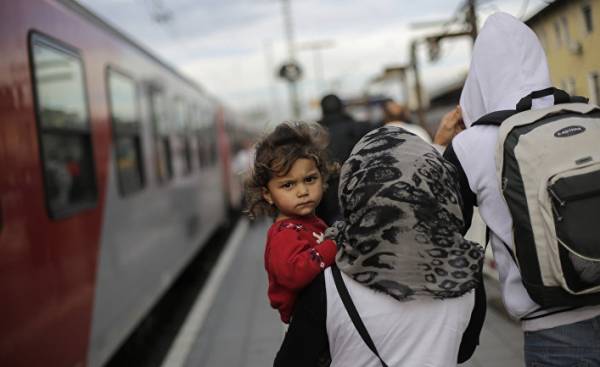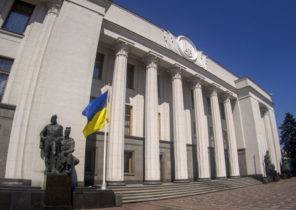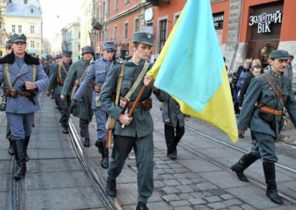
Mosque, Perleberger Strasse in the Berlin district of Moabit is closed. She became famous because it appeared the Berlin terrorist Anis Amri. To date, the club Salafis Fussilet 33 in the mosque is forbidden. Amri was a Tunisian, but the club mainly served as a meeting place for the radical Chechen Islamists from Berlin and Brandenburg. Former club President Ismet D. has been on trial. It is assumed that he supported the Syrian terrorist group “Dzhunud al-sham” (organization banned in Russia — approx. ed.) composed of many Chechens, accompanying the Chechen fighters on their way to Syria and paying for their tickets
Young Chechens for many years to join the Salafist community in Germany. Some come as Islamist militants, others become radical views here. It is a particularly serious problem is shown in the Eastern Federal länder. In Berlin, the Chechens Islamists for several years now pose a threat to society, in Brandenburg according to the Ministry of internal Affairs there are about 80-90 of radical Islamists, most of whom are Chechens.
Supervision requires attracting the huge number of policemen and employees of the office for the protection of the Constitution. Early in the German security agencies believed that the Islamists of the Russian Republic in the North Caucasus does not inspire serious concern. “Caucasus Emirate” (banned in Russia organization — approx. ed.), in which they joined, viewed Germany as a “springboard for a retreat and place of rest.” In recent years, at least after the organization was subject to the “Islamic state” (banned in Russia — approx. ed.), everything changed.
The risk of expulsion from Germany is quite low
The number of Chechen Islamists is growing because more and more Chechens arrive in Germany. After the collapse of the USSR the Chechens managed to hold two destructive wars against the Russian Central government: the first war in 1996, they won, and the second, which began in 1999, when Putin already lost. Over the past five years thousands of residents of Chechnya annually arrived in Germany, and this migration took place in waves. Since 2012, the shelter has requested nearly 36 000 Chechens. Most of them arrived in the country without having a visa and a valid passport.
Last year, more than 122 thousand citizens of the Russian Federation has asked to grant asylum in Germany. Of them, according to some, is 9850 Chechens, that is more than 80%. It was the massive wave of immigrants from Russia in 2013. This year the application for asylum in Germany has filed almost 15500 Russians. Among them, more than 13600 people, about 90% were Chechens. The shelter they provide in rare cases. Of all the Russians requested asylum in Germany, over the past year, only 5.2% received refugee status or right to asylum, and for the Chechens the quota was altogether of 4.3%.
In fact, most Chechens don’t have to have the right to stay here. However, the risk that they will have to leave the country is quite low. The Chechens, as a rule, from your Motherland go to Belarus, and there apply for asylum at the Polish border. However, since in Poland the conditions of accommodation for refugees is worse, and the financial benefits are much lower they’re heading to Germany. Here they are placed in camps initial reception, and six months allocated to municipalities in various Federal lands.
It is often impossible to send refugees back to Poland
Under the Dublin agreement, the vast majority of Chechens who requested asylum in Germany, in fact, should be sent back to Poland. Because it is in the EU country they originally sought asylum. The Federal office for migration and refugees (BAMF) did not initially consider applications for asylum lodged by Chechens.
However hardly someone from the Chechens to return to Poland. Last year, according to the Federal Ministry of the interior, in the period from January to October in Poland returned only 560 people.
Because relationships within the family not break the fast is the reason why expulsion is not possible — what is missing is any member of the family, someone sick, often women are pregnant or just within the family the child was born.
In Brandenburg, where last year there were about 2,300 Chechens who requested asylum in 2016, only 22 families, or a total of 99 people were returned to Poland, according to the Ministry of the interior in Potsdam. Moreover, often a few weeks later those who were sent back to Poland, back to Germany. It’s called the “revolving door effect”. Therefore, in Brandenburg want the Dublin agreement did not apply to Chechens. Then the applications for asylum could be considered immediately in the institutions of initial refugee reception and from there sending rejected applicants back to Russia.
However, the government is beneficial to follow the Dublin regulation, therefore, for the Chechens do not make exceptions. Deportation to his homeland, namely in Russia, it happens even rarer than return to Poland. Over the past year in Russia were deported Chechens 110. This is about 1% of the total number of arrivals in the same year in Germany.
It is believed that the tendency of the Chechen men to violence is particularly high
In the state bodies of the Chechens consider it a particularly serious group of refugees. Chechens pose a threat to society, that is, people from the point of view of the police, capable of carrying out terrorist acts, are only a small, even and especially dangerous part. There are other, equally serious problems: in the institutions of initial admission of refugees to the Chechen men as particularly prone to violence. Sometimes it comes to a fight or a knife fight between the Chechens, on the one hand, and the Syrians or Africans, for example, from Cameroon or Chad. “If there are Chechens and North Africans — expect trouble,” — said in the Ministry of internal Affairs of Brandenburg.
The propensity for violence due to militant mentality, code of honor, and pronounced a “macho image” inherent in the Chechens. Besides, clan structures, which unite the Chechens, and also remain outside the country. Institutions the reception of refugees can sometimes be to see this on my own experience. Sometimes in the camp of reception of refugees coming group of Chechens, to avenge those who have wronged their compatriots or went with them to the conflict.
In Brandenburg this led to the fact that the Chechens from the camp’s initial reception in Eisenhüttenstadt were transferred to a special office where they no longer were located together with other applicants for asylum. The new monastery continued to be a problem with the fact that Chechen men beat their wives and children. Also, there are often cases of danger to the welfare of children as the mother for a few hours leave babies unattended.
Why so many Chechens leave their homeland?
In the German organized crime Chechens for several years play an important role. Many of them are involved in extortion, looting and protect business districts against other criminal gangs, they often act on behalf of other ethnic groups. In November, several Saxon cities as well as in Thuringia and Rhineland-Palatinate raided 16 of the Chechens; they are accused of creation of criminal community.
Why such a large number of Chechens leave their homeland and arrive in Germany? The most common reason is that the current head of Chechnya, Ramzan Kadyrov rules with an iron hand. Kadyrov gave to family and colleagues the most profitable offices in the Republic, and opponents he does not spare. In Chechnya do not comply with the principles of the constitutional state, the armed formations of Kadyrov’s impunity to do what they want. And so, among other things, for a long time.
Why is new wave going? During the first big wave of 2012 and in 2013 played the role of rumors that Chechens in Germany give “money in greeting,” a house or land. However, it is unclear who spread these rumors and why allowed their proliferation in a tightly controlled Republic. Furthermore, it is unclear whether arriving in Germany, the Chechens believed in existence of such gifts.
According to some law enforcement agencies, the approaching Winter Olympics in Sochi was the reason that Russia many were allowed to leave, so as to get rid of disgruntled elements. Then the German authorities have reacted in different ways. The Federal office for migration and refugees (BAMF) initiated an information campaign in Chechnya, designed to deny the rumors. The Federal police and Federal office for the protection of the Constitution negotiated with its partner institutions in Russia, during which was discussed the problem of mass immigration.
Indeed in 2014, the wave went on the decline: instead of more than 15 thousand have been registered only 5500 applications for asylum from Russia. However, in 2015 began a new wave of migration, which reached its apogee in 2016. Whether it was related to the fact that the Chechens saw as Germany began to accept large numbers of Muslims? In the circles of the security services said that in the hundreds of Chechens who have arrived in 2016, you can confirm that they already came to Germany in 2013.
It is advantageous for Moscow to play the Chechen card
One explanation of these waves of migration is that Russia is not interested in ending the flow of illegal migrants to Germany. Furthermore, the Russians want to show the Germans that can create a problem and then to resolve it. Russia has made so significant a contribution to the migration crisis, a deeply divided Germany that caused them difficulty even more aggravated. Therefore, it is advantageous for Moscow to play the Chechen card. During negotiations with the Russians, which the German side insisted on the suppression of the influx of Chechens, the Russian side assured that the issue is not about the immigrants from the Russian Caucasian republics, but the Chechens from Kazakhstan.
But it is not — especially because the Chechens deported by Stalin to Kazakhstan during world war II, there are to date only 0.2% of the population. As an example of the image of the Russian actions bring the situation with refugees, which in 2015, penetrated into Finland and Norway in the so-called “polar route”. They crossed the region, previously considered a taboo area. Only after the governments in Helsinki and Oslo held talks with Moscow, the path is again blocked.
Migration as a weapon? It is difficult to prove. The German police, as stated in the response to the request, there is “no evidence” that the flow of migrants from Chechnya are driving. Here’s what we can say for sure: the Russian authorities and secret services aware of the fact that thousands of Chechens go through Belarus to Poland. A few days ago, the Russian secret service FSB for the first time since 1995, has imposed control on the border with Belarus. But whether there is less of Chechens to go to Germany, in General, is unclear. One of the experts of the German government on the issue describes the experience of cooperation with Russia in questions of illegal migration in the following way: “what makes the Germans the problem is for the Russian trump card”.







